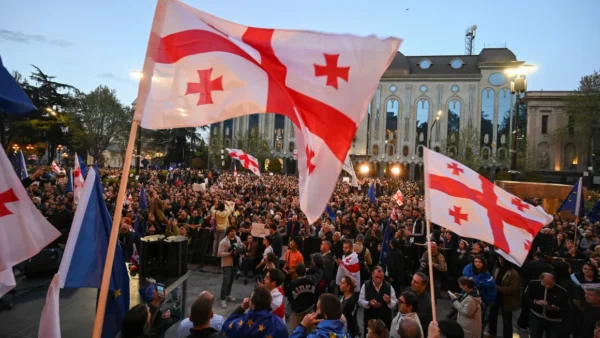Overview of Georgia’s Path to EU Integration
Since gaining independence from the Soviet Union in 1991, Georgia has tried to forge stronger ties with the West. Georgia has been working toward joining the European Union (EU) for years. By entering the European Neighbourhood Policy in 2006 and signing an Association Agreement in 2014, it has strengthened its relationship with the EU. These agreements have expanded trade opportunities for Georgian businesses and, since 2017, allowed Georgian citizens visa-free travel to EU countries. Each of these steps shows Georgia’s clear wish to strengthen its ties with the EU and, one day, become a full member.
However, this path is complicated by political divides within the country. In recent elections, the ruling Georgian Dream party—informally led by billionaire Bidzina Ivanishvili—secured victory, raising new questions about Georgia’s direction. While the Georgian Dream party claims to support EU integration, it has introduced policies that resemble Russian measures, such as restrictions on democratic freedoms, which worry EU officials. This divide is felt deeply within Georgia, with pro-EU supporters seeing EU membership as a path to greater democracy and economic opportunity, while pro-Russian voices argue for stronger ties with Moscow.
Public Sentiment vs. Government Stance
Georgia’s citizens have been vocal about their desire to join the EU. Recent polls show that around 80% of Georgians support joining the EU. In the days leading up to the October election, tens of thousands of Georgians flooded the streets of Tbilisi, carrying EU flags and calling for closer ties with Europe. They also voiced their rejection of government policies they believe are moving Georgia away from Europe.

However, there’s a clear divide between the public’s pro-EU hopes and the government’s actions. President Salome Zourabichvili, who openly supports EU integration, has voiced sharp criticism of the ruling party’s stance. Unlike Prime Minister Irakli Garibashvili, who leads the government and faces accusations of distancing Georgia from Europe, President Zourabichvili rejected the 2024 election results, alleging that the ruling party is undermining Georgia’s ties with the EU. She even called the election a “Russian special operation” and encouraged protests against the outcome. Her statements underscore the rising tension not only between the government and the public but also within Georgia’s leadership itself.
Pro-Russian? The Georgia-Russia Relationship
Georgia’s relationship with Russia has been tense for years, marked by conflict and conflicting interests. After Georgia declared its intentions to move closer to the West, relations with Moscow soured, leading to the 2008 war when Russia invaded and occupied the regions of South Ossetia and Abkhazia. Russia has maintained a military presence in these territories, keeping them under its control and causing significant strain between the two nations.
Georgian Dream, founded by Ivanishvili, has often echoed Russian narratives, suggesting that Western influence is the root of regional conflicts rather than Russian aggression. This pro-Russian tone has raised concerns that the party may be guiding Georgia away from the EU and closer to Russia. Rural regions, where Georgian Dream receives strong support, have shown signs of favoring Moscow’s influence, creating divisions within the country over its future direction.
Legislative Barriers to EU Integration
One of the biggest obstacles to Georgia’s EU membership is recent legislation that the EU sees as undemocratic. In early 2024, Georgian Dream introduced the “foreign agents” law, which requires NGOs and media receiving foreign funding to register as “foreign agents.” Critics argue this law resembles Russia’s restrictive measures, which have been used to silence opposition voices and limit civil freedoms. The EU reacted strongly, freezing financial aid to Georgia and halting talks on further EU integration until the law is repealed.
In addition, the ruling party has enacted yet another action restricting LGBTQ+ rights and pushing conservative values, distancing Georgia further from EU ideals of inclusivity and human rights. These moves have led European officials to warn that Georgia’s EU candidate status is at risk unless it reverses these policies and returns to democratic standards.
Geopolitical Implications
Georgia’s location makes it important not only to Europe but to Russia as well. Positioned along the “Middle Corridor,” which links Europe to Asia, Georgia serves as a critical transit route for trade and energy supplies. A closer relationship between Georgia and Russia could allow Moscow to exert influence over this corridor, affecting European energy security and trade flows. This could limit Europe’s access to alternative routes that bypass Russia, making Georgia’s political alignment a crucial factor in the EU-Russia power struggle.
Additionally, Georgia’s Black Sea ports, like Batumi, are strategically valuable. A Georgia aligned with Moscow could give Russia increased military and economic control in the Black Sea region. This would not only undermine EU influence but also expand Russia’s capacity to evade international sanctions and project its power into Europe’s backyard.
The EU’s Strategic Role and Diplomatic Efforts
The EU has long supported Georgia’s democratic development and has provided substantial aid to strengthen its institutions and promote peace. One notable area of EU involvement has been in South Ossetia and Abkhazia, where it leads monitoring missions aimed at maintaining stability. However, Georgian Dream’s recent policies have strained this relationship, with the EU issuing warnings that further democratic backsliding could lead to sanctions or other restrictive measures.
The EU has been cautious in its approach, aiming to target specific officials with sanctions rather than imposing broad measures that could harm the pro-EU Georgian population. EU Foreign Policy Chief Joseph Borrell has stressed that Georgia’s commitment to democratic standards is essential for continued support. While the EU seeks to balance its response, it remains dedicated to backing Georgia’s pro-European citizens, hoping to prevent the country from falling fully into Russia’s orbit.
Conclusion
Georgia’s 2024 parliamentary election represents a pivotal choice between a democratic, EU-aligned future and a drift toward authoritarianism and Russian influence. Despite strong public support for EU membership, Georgian Dream’s leadership has pursued policies that mirror Russian governance, leading to concerns within the EU and the US about Georgia’s democratic future.
The coming years will reveal whether Georgia can bridge the gap between its government’s policies and its people’s aspirations, ultimately determining its place in either the EU or Russia’s sphere of influence.




